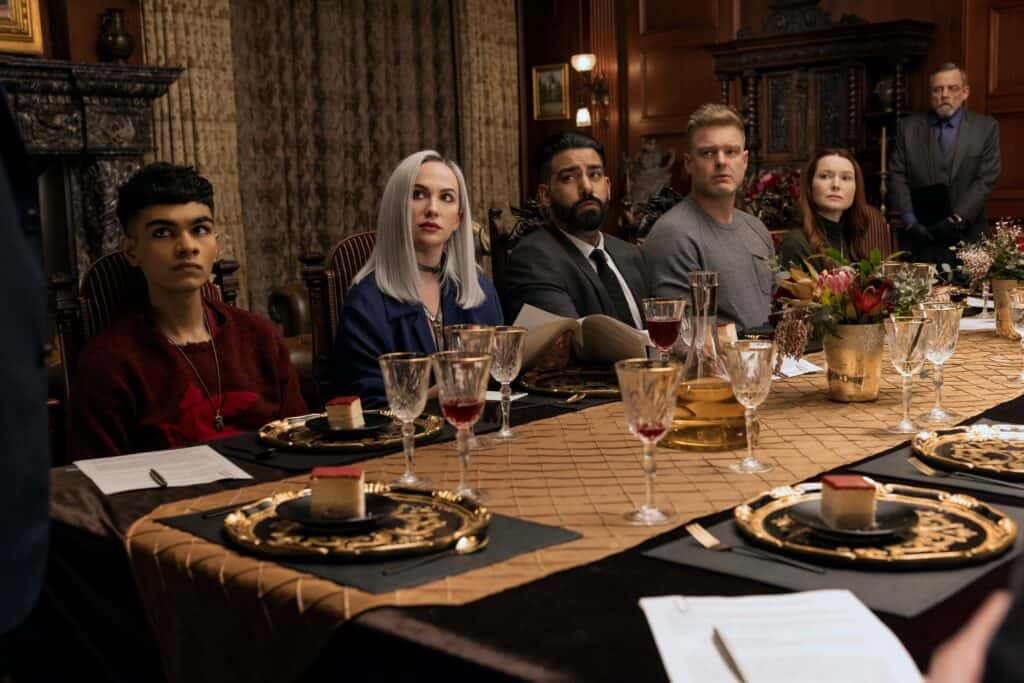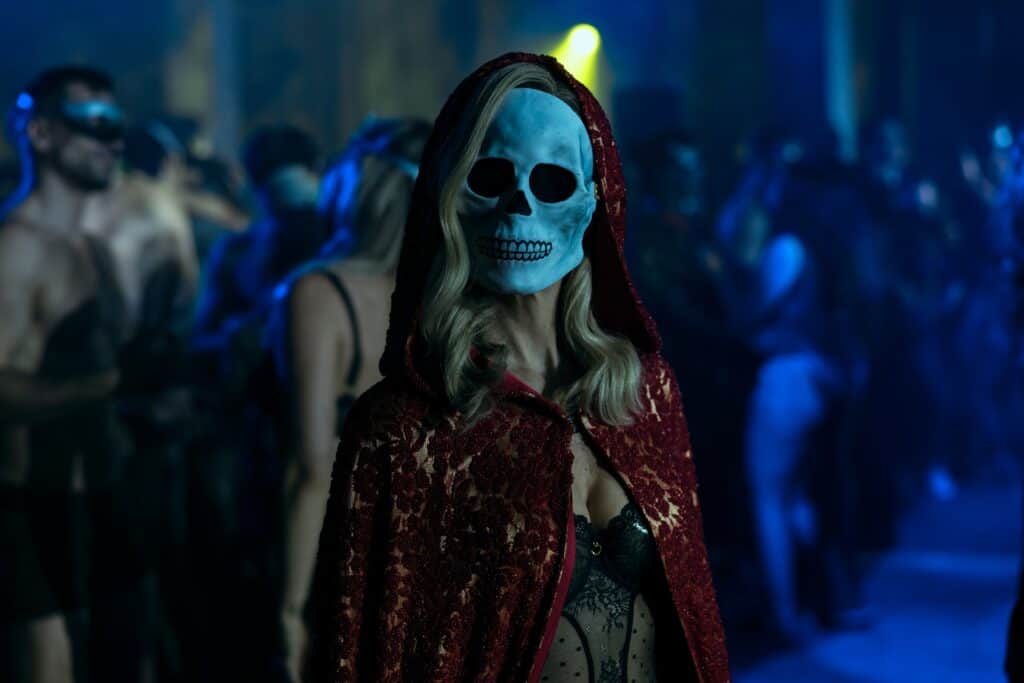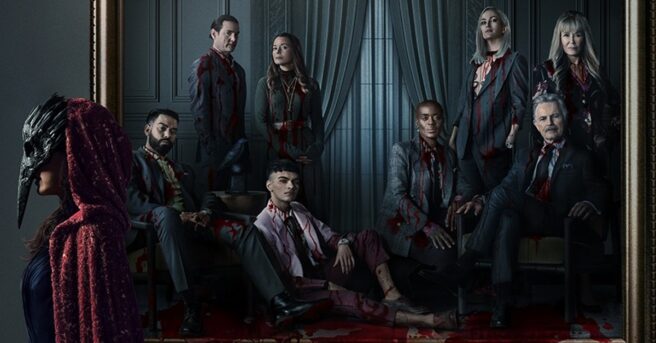Mike Flanagan’s latest Netflix series is a ghoulishly fun cross between Succession and Edgar Allan Poe.
PLOT: In this wicked series based on the works of Edgar Allan Poe, ruthless siblings Roderick and Madeline Usher have built Fortunato Pharmaceuticals into an empire of wealth, privilege and power. But past secrets come to light when the heirs to the Usher dynasty start dying at the hands of a mysterious woman from their youth.
REVIEW: Since the premiere of Before I Wake and Hush on Netflix in 2016, Mike Flanagan has called the streaming platform his creative home. But, it was not until The Haunting of Hill House that Flanagan became a recognizable name to the masses. With an original film and four series for Netflix, Mike Flanagan’s final project under his overall deal may be his most ambitious until he rolls on his potential adaptation of Stephen King’s The Dark Tower. Drawing inspiration from another master of the macabre, Flanagan’s The Fall of the House of Usher is an unconventional twist on the iconic short story of the same name. Bringing together his repertory players from virtually all of his films and series to date, Flanagan’s version of The Fall of the House of Usher is a grand guignol blend of gothic horror with the cutthroat world of the ultra-wealthy. Consider it Succession if Edgar Allan Poe wrote it, and you know what you are in for. This is a spooky series with some truly innovative takes on the source material that will please fans of Flanagan and Poe alike.

Knowing what Flanagan has done with the classic stories of Shirley Jackson and Henry James, I expected a contemporary twist on The Fall of the House of Usher. Instead of updating that single Poe yarn, Flanagan took a cue from last year’s Christopher Pike mash-up The Midnight Club and modernized multiple tales from the classic author. At its core, the Fall of the House of Usher tells the story of Roderick Usher (Bruce Greenwood), a rich man whose crumbling manse represents his own downfall. But, by widening the scale of the story, Flanagan inserts a greatest hits compilation of Edgar Allan Poe stories organically into the narrative structure. From the trailer alone, you can tell that Usher includes riffs on “The Masque of the Red Death,” “The Black Cat,” “The Tell-Tale Heart,” “The Murders at Rue Morgue,” “The Raven,” and many more. The sheer number of Poe references in this series is staggering and goes beyond full stories into names pulled from the author’s poems and contemporaries from his life. Short of a true biopic, The Fall of the House of Usher is the ultimate homage to one of the icons of horror literature.
The Fall of the House of Usher begins with Roderick Usher’s six children dead without divulging how each Poe story factors into the overall narrative. Amid a massive lawsuit against his company, Fortuna Pharmaceuticals, Roderick invites prosecutor C. August Dupain (Carl Lumbly) to his home, where he plans to tell the lawyer his confession. Over the eight-episode series, Usher’s tale includes a chapter focused on the demise of each of his kids and flashbacks to what set this entire series of events in motion. By allowing each chapter to connect to the next and serve as a partially standalone story, The Fall of the House of Usher works as both an anthology and a singular tale anchored by the central conversation between Usher and Dupain. Bruce Greenwood, who stepped in for Frank Langella early in production, previously worked with Flanagan on the Stephen King adaptation of Gerald’s Game. Usher is a triumphant role for the veteran actor who has appeared in everything from J.J. Abrams’s Star Trek to playing John F. Kennedy in the film Thirteen Days. While spending most of his time with Lumbly, a veteran of Flanagan’s Doctor Sleep, Greenwood is astoundingly good as the patriarch watching his empire and family crumble before him.
As much as The Fall of the House of Usher is a greatest-hits compilation of Poe stories, it is also a mega-cast of Mike Flanagan’s extended roster of talent. The main cast includes actors from multiple of the director’s projects, including Carla Gugino as Verna, Henry Thomas as Frederick Usher, Kate Seigel as Camille L’Espanaye, Samantha Sloyan as Tamerlane Usher, T’Nia Miller as Victorine LaFourcade, Rahul Kohli as Napoleon Usher, Sauriyan Sapkota as Prospero Usher, and Ruth Codd as Juno Usher, Amongst the supporting cast are Katie Parker from Flanagan’s Absentia, Michael Trucco from Hush, Annabeth Gish from Before I Wake, Lulu Wilson from Ouija: Origin of Evil, Kyleigh Curran from Doctor Sleep, Robert Longstreet from The Haunting of Bly Manor, as well as Crystal Balint, Matt Biedel and Zach Gilford from Midnight Mass, and Igby Rigney and Aya Furukawa from The Midnight Club. New additions to Flanagan’s world are Willa Fitzgerald and Mary McDonnell as Madeline Usher, Mark Hamill as Arthur Pym, and Paola Nunez as Alessandra Ruiz. Everyone in this cast is well-suited for Flanagan’s style, which the series’ tone accentuates. A pitch-black sense of humor pervades the somber themes, but it never boils over into pulp or melodrama. That being said, this series is closer to The Midnight Club than Midnight Mass.
Based on the character names listed, you could dig through Poe’s bibliography to determine which stories they are connected to. Still, Flanagan and co-writers Justina Ireland, Dani Parker, Jamie Flanagan, Emmy Grinwis, Matt Johnson, Rebecca Klingel, and Kiele Sanchez are not beholden to the source material. The core of the stories are translated here, but the narrators and victims from the written page are switched around often to keep the viewer on their toes. But, as each Usher family member meets their untimely demise, you will make no mistake as to which Poe story their comeuppance was sourced from. Flanagan, who directed half of the series and handed the other four episodes to his long-time cinematographer Michael Fimognari, takes a cue from his idol Stephen King in imbuing real-world events into the mix. The Ushers are responsible for the opioid epidemic in this tale, a timely connection to current news. There are also many jabs at political figures who remain nameless, but an astute viewer will know exactly who the writers are mocking.

As a big Flanagan fan, I cannot help but find parts of this series uneven. So many of these performances are excellent, especially Bruce Greenwood, Carl Lumbly, and the always great Carla Gugino, but there are also some odd missteps along the way. Ruth Codd, who rose to fame on social media and stood out in The Midnight Club, is oddly cast here as Roderick Usher’s new wife, Juno. The role feels somewhat forced and didn’t entirely work for me as Juno seems more comic relief than a vital part of the tale. Mark Hamill is good in an understated role as the Usher’s primary attorney and fixer. Still, Mary McDonnell’s awful wig often overshadows him when they share scenes together. Rahul Kohli and Samantha Sloyan own their scenes as two Usher siblings. However, their performances sometimes feel like takes on Kieran Culkin and Sarah Snook in Succession rather than original creations. These are nitpicks in the grand scheme of things, as The Fall of the House of Usher is built around the main characters being on the brink of death. We have a front-row seat to their karmic retribution, but I could not help but feel that many character traits are introduced that do not get explained in a worthwhile manner as the series heads toward the big reveal at the end.
The Fall of the House of Usher does not quite reach the level of The Haunting of Hill House or Midnight Mass. I expect fans will find this series closer to The Haunting of Bly Manor, which I do not mean as a slight in any way. Like Edgar Allan Poe’s tales, this series focuses on short stories with romantic and gothic tones that feature a main character getting their just desserts. Flanagan brings his eye for the macabre and injects the right amount of blood and guts to make this a ghoulish experience. Most of these characters deserve what is coming, so witnessing them suffer is a cathartic experience. By incorporating Poe’s poetry and figures from the author’s real life, Mike Flanagan and his writing team have built a beautiful ode to Poe and one that should open a whole new generation to check out his writing. The Fall of the House of Usher is a haunting and beautiful series. While a few characters and subplots do not quite work, the vast majority of them do. This is not as scary as Hill House, but it is every bit the worthy Halloween binge this October.
The Fall of the House of Usher premieres on October 12th on Netflix.


